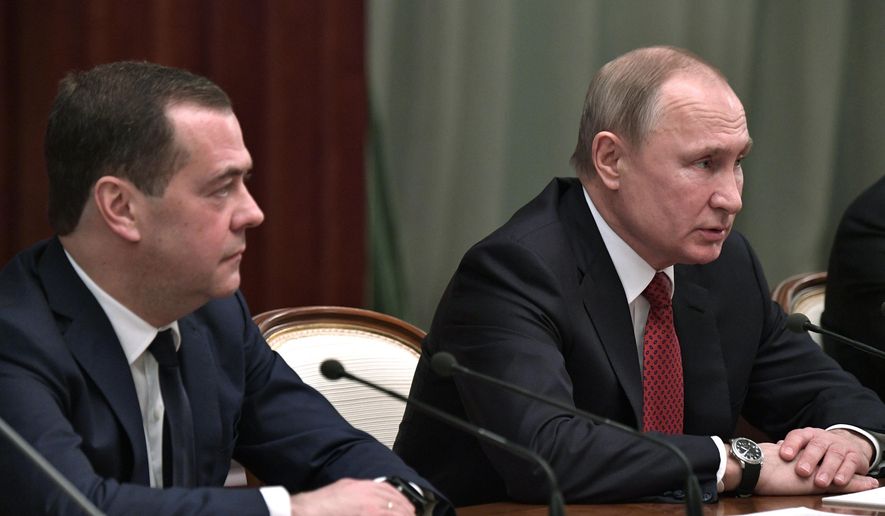Russian President Vladimir Putin set the stage Wednesday for sweeping constitutional changes that could allow him to continue wielding more power than anyone else in Moscow long after his current presidential term ends in four years.
In a sign that a pre-orchestrated restructuring may be in the works, several top Russian officials — including Mr. Putin’s number two, Prime Minister Dmitry Medvedev — submitted their resignations Wednesday after Mr. Putin proposed the changes in his annual state of the nation address.
In the televised speech, Mr. Putin called for shifting authority to Russia’s parliament in a manner that would give it the authority to create a future leadership position for him. Mr. Putin, who is 67 and has held power in Moscow since 1999, is barred under the current constitution from staying in the presidency beyond 2024.
Analysts in western Europe quickly characterized the proposal as a sign Mr. Putin is plotting a path to retain his status as Russia’s most powerful leader even after he steps down from the presidency.
“I wouldn’t exclude that Putin sees himself taking on the speaker’s chair in the parliament in the future,” political analyst Abbas Gallyamov told the German news agency Deutsche Welle. “Since Putin’s main task now is to secure his own political future, we can assume he is paving the way for himself there.”
A report by Reuters suggested another option could be that Mr. Putin seeks to emerge as head of the State Council. The news agency noted that in his remarks Wednesday, Mr. Putin said the body should be given more powers under the constitution.
Reuters cited Dmitri Trenin, head of the Moscow Carnegie Center, as saying Mr. Putin appears to be moving to limit the power of any presidential successor after he leaves the presidency in 2024.
Mr. Medvedev and other top officials, meanwhile, submitted their resignations hours after Mr. Putin thanked Mr. Medvedev for his service but said the prime minister’s Cabinet had failed to fulfill all of its objectives.
But in his remarks, Mr. Putin also said Mr. Medvedev would now take up a new position as a deputy head of Russia’s presidential Security Council.
Mr. Medvedev, a longtime close associate of Mr. Putin’s, has served as Russia’s prime minister since 2012. He spent four years before that as president in 2008-2012, becoming a placeholder when Putin had to switch into the prime minister’s office because of constitutional term limits on the presidency.
Mr. Medvedev obediently stepped down after just one term as president and let Putin reclaim the top job in what was widely seen as cynical political maneuvering and triggered massive protests in Moscow.
• This article is based in part on wire service reports.
• Guy Taylor can be reached at gtaylor@washingtontimes.com.




Please read our comment policy before commenting.